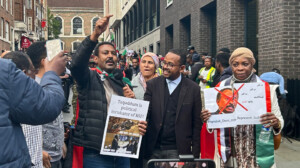Sudan marks first anniversary of ‘December revolution’
On Friday, mass rallies were held in Khartoum and several other states across Sudan to mark the first anniversary of the December revolution under the slogan “All of its parts are our homeland.”
 Protests that began in Ed Damazin in December 13, 2018, soon spread to the rest of Sudan and culminated in the December Revolution that led to the ousting of President Omar Al Bashir (File photo: RD)
Protests that began in Ed Damazin in December 13, 2018, soon spread to the rest of Sudan and culminated in the December Revolution that led to the ousting of President Omar Al Bashir (File photo: RD)
On Friday, mass rallies were held in Khartoum and several other states across Sudan to mark the first anniversary of the December revolution under the slogan “All of its parts are our homeland.”
Various activities were organised such as political forums, musical festivals, and commemoration of those who sacrificed their lives for change and freedom.
The December revolution that put an end to 30 years of dictatorship is presumed to have started on December 13, 2018 in Ed Damazin and then spread all over Sudan.
In Blue Nile state, a mass rally was held at Ed Damazin stadium with the participation of representatives of the Sudan Sovereign Council, the cabinet, and the Forces for Freedom and Change (FFC). Among the activities were political speeches, music, and debates.
Rallies
In El Gedaref, activists and the FFC organised a sports competition, in which a team from Khartoum participated.
In Khartoum, rallies were held in various neighbourhoods such as Abu Adam and El Sahafa, El Arbaeen Street and El Fitihab Street in Omdurman, and El Mauna Street and Shambat in Khartoum North.
The participants raised the Sudanese flag and carried banners with slogans of the revolution, “Freedom, Justice, and Peace”, and pictures of those who lost their lives during the December revolution.
December revolution
From mid-December 2018, Sudan experienced a popular uprising called-out by the Sudanese Professionals Association and signatories to the Declaration of Freedom and Change, calling for the overthrow of the regime. Demonstrations were met with violent resistance from the government, however the sheer volume of public support resulted in the uprising reaching critical mass. On April 11, the 30-year dictatorship of Omar Al Bashir was overthrown by a military coup.
Al Bashir and several members of his deposed regime have been arrested and charged for corruption, and their part in government violence against protestors in the lead-up to the coup.
On Saturday, Al Bashir himself was convicted on charges of corruption, and sentenced to two years in a ‘correctional facility’ for older prisoners.
Judge El Sadig Abdelrahman stipulated that Al Bashir’s two-year sentence will commence after a verdict has been reached in another case against him regarding the killing of demonstrators during the protests that led to his removal.
Ironically, Al Bashir, is currently being held in Khartoum’s Kober Prison, which became notorious under his regime for holding countless political detainees, many of whom were tortured or worse.
The oused president has also been charged with incitement and involvement in the killing of protesters, and this week he was summoned for questioning over his role in the 1989 military coup that brought him to power.
On Thursday, the second wife of Al Bashir, Widad Babikr, was arrested from her home in Khartoum North, on charges of illegal ownership of wealth and suspicious richness.
Radio Dabanga’s editorial independence means that we can continue to provide factual updates about political developments to Sudanese and international actors, educate people about how to avoid outbreaks of infectious diseases, and provide a window to the world for those in all corners of Sudan. Support Radio Dabanga for as little as €2.50, the equivalent of a cup of coffee.












 and then
and then